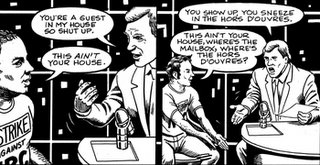American Splendour

We’ve joined a DVD home delivery service. It doesn’t have near enough non-American DVDs on its lists, but it does allow us to keep up with some interesting stuff currently coming out.
American Splendour is the filmed story of the comically serialised story of Harvey Pekar, a doleful denizen of the city of Cleveland. I found it confusing and unengaging at first, but it soon picks up momentum. Harvey, played by Paul Giametti when not being played by himself, slouches through life maintaining a blackly humorous internal monologue re its little ironies and problems. An underground comic fan, his life, such as it is, is given a fillip of sorts when a comic illustrator he has befriended, Robert Crumb (apparently now regarded as a ‘seminal underground cartoonist’ – needless to say I’m not au fait with that world), agrees to collaborate on a comic of his life as file clerk and drudge-about-town. So American Splendour (the Americans spell it Splendor but I can’t bring myself to follow them) is born. It a-chieves a moderate (another word for underground) success, and leads to other vital developments in his life, most notably in attracting to him his eventual wife Joyce Brabner (Hope Davis), and even to guest appearances on the David Letterman Show.
These appearances provided the most thought-provoking aspect of the film for me. It’s noteworthy though unsurprising that the mostly American reviewers gathered at Rotten Tomatoes (who were overwhelmingly favourable in their responses) barely mentioned Pekar’s clashes with Letterman. Perhaps they didn’t want to get bogged down in the psychological-cultural analysis this might’ve led to, or perhaps they’re peculiarly blind to this kind of focus, as they seem to be, for example, when reviewing Michael Moore’s films.
I watch Letterman from time to time, against my better self. Like Oprah he’s a conduit for America’s obsession with celebrity, his guest list reading like a who’s who of who’s in. It’s a kind of mutual creative thing, the invited guest knows he or she has or still has the requisite je ne sais quoi, and his or her appearance allows ole young Dave to bask in the knowledge that he still has the je ne sais quoi to pull em in. Beyond that there’s not much to it – a televised version of Who magazine, peppered with in-jokes.
Harvey Pekar was invited on the show, clearly, because he’s an anti-celebrity. This allows Letterman to maintain his obsession with celebrity while also trying to claim an element of daring and edginess, again for the purpose of establishing or maintaining the street cred deemed necessary to pass himself off as more than just a breathlessly star-struck scalphunter. It also allows him to indulge the notion of himself as gracious bestower of favours upon the dubiously deserving. It seems to me that the ongoing guff about Oprah on his show really captures Letterman’s motivation and ambition. She’s his rival and nemesis, it seems, and his dislike of her is all about professional jealousy. It seems people like Oprah really matter to Letterman, whereas people like Harvey Pekar are both bizarre and insignificant to him, in a way that’s actually quite chilling.
I’ve seen the film for a second time, and perhaps I’m overly tough on Letterman, it may well be that he does, or did, enjoy reading the comics, but it still seems that his interest in Pekar is more an interest in a peculiar specimen, one that can be exploited, even goaded, for a bit of fun and profit, a bit like the way animals are taunted in the zoo by hubristic kiddies. To his credit, Pekar tried to give as good as he got, despite the massive power inbalance built into such a show. ‘Megalomaniac’, says Harvey’s wife Joyce after witnessing one of these interviews, and this refines down beautifully all the discomfort and frustration any Pekar supporter might feel. It’s also the ‘brevity is the soul of wit’ response that’s no doubt essential to the comic’s success.
I enjoyed the film more the second time, and didn’t find the opening scenes anywhere near as slow and dull or confusing. To tell the truth I can’t put my finger on why I found them a problem first time around, though many critics found the same. The film’s design is clever and effective, incorporating actors playing the parts, the real characters those actors play, and the comic-book versions, allowing us glimpses into comic book construction, film construction and real struggling lives, without ever being heavy-handed about its approach.
In fact it’s the apparent lightness, effortlessness, seamlessness of the film’s construction that has ensured its success, I think. It’s a great little film that tells us about an America we need to know more about, a no-bullshit place of small victories and small defeats and unheroic stoicism, something we can respond positively to at a time when the arrogance of certain Americans threatens to bias us irreversibly.
There's a good summary of Pekar's issues with Letterman here.


0 Comments:
Post a Comment
Subscribe to Post Comments [Atom]
<< Home